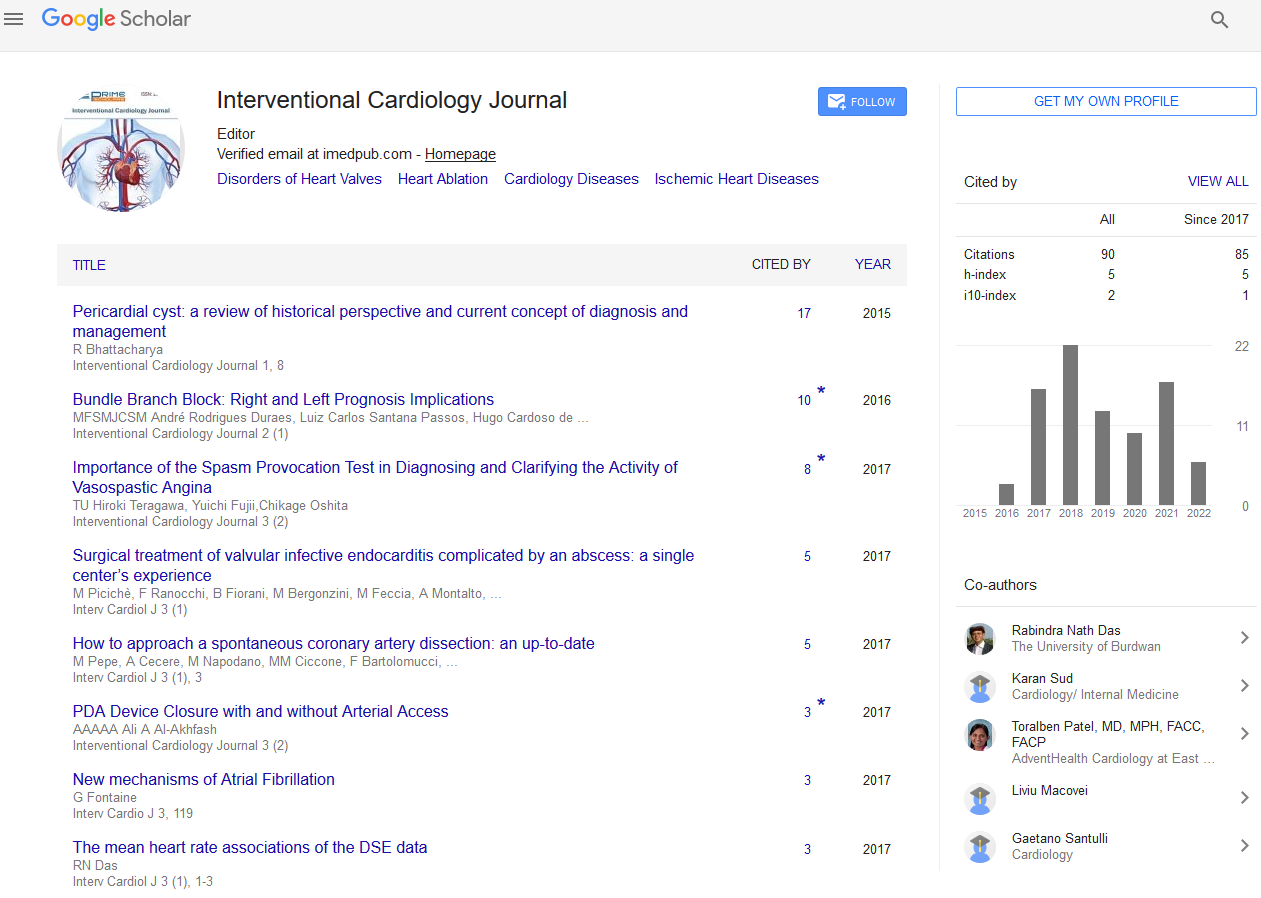Commentary - (2024) Volume 10, Issue 9
Comprehensive Approaches to Arrhythmia Management: Current Strategies and Emerging Trends
Jenkins Melissa*
Department of Cardiology, Johns Hopkins University, United States
*Correspondence:
Jenkins Melissa,
Department of Cardiology, Johns Hopkins University,
United States,
Email:
Received: 02-Sep-2024, Manuscript No. ipic-24-21473;
Editor assigned: 04-Sep-2024, Pre QC No. ipic-24-21473 (PQ);
Reviewed: 18-Sep-2024, QC No. ipic-24-21473;
Revised: 23-Sep-2024, Manuscript No. ipic-24-21473 (R);
Published:
30-Sep-2024, DOI: 10.21767/2471-8157.10.09.84
Description
Arrhythmias, or irregular heartbeats, represent a diverse
group of conditions with varying degrees of severity, ranging
from benign palpitations to life-threatening disturbances that
can significantly impact patient health and quality of life.
Effective management of arrhythmias requires a multifaceted
approach that includes accurate diagnosis, appropriate
treatment strategies, and ongoing monitoring to tailor
interventions to individual patient needs. This article delves
into current practices and emerging trends in the management
of arrhythmias, highlighting the importance of a personalized
approach to treatment. The management of arrhythmias begins
with a comprehensive diagnostic evaluation. Pharmacological
management is often the first line of treatment, with a range
of antiarrhythmic drugs available to address various types of
arrhythmias. For instance, beta-blockers and calcium channel
blockers are commonly used to manage atrial fibrillation, while
sodium channel blockers may be prescribed for ventricular
arrhythmias. The goal of pharmacotherapy is to restore
normal heart rhythm, prevent recurrence of arrhythmias,
and minimize symptoms. In cases where medication alone is
insufficient, interventional procedures may be considered.
Catheter ablation is a minimally invasive technique that
targets and destroys abnormal electrical pathways in the
heart responsible for arrhythmias. This procedure has proven
effective for many patients with recurrent arrhythmias that are
resistant to drug therapy. Another important interventional
option is the implantation of a pacemaker or an implantable
cardioverter-defibrillator. Pacemakers are used to regulate
slow heart rhythms, while are designed to detect and correct
life-threatening arrhythmias through electrical shocks. Recent
advancements in technology have further enhanced the
management of arrhythmias. The development of wearable
devices and remote monitoring systems allows for continuous
tracking of heart rhythms outside of clinical settings. These
innovations provide valuable data that can help clinicians make
more informed decisions about treatment adjustments and
ensure timely intervention if arrhythmias recur. Additionally,
the integration of artificial intelligence and machine learning
into diagnostic tools promises to improve the accuracy of
arrhythmia detection and risk stratification. Personalized
medicine is becoming increasingly important in the
management of arrhythmias. Genetic testing and biomarkers
are being explored to identify patients who may be at higher risk
for certain types of arrhythmias or who may respond differently
to specific treatments. By tailoring interventions based on
individual genetic profiles and other personal factors, clinicians
can enhance the effectiveness of treatments and reduce the risk
of adverse effects. Despite these advances, challenges remain
in the management of arrhythmias. Adherence to treatment
regimens is a significant issue, as patients may struggle with
the complexity of their medication schedules or experience
side effects that impact their quality of life. Education and
support are critical in helping patients understand their
condition and adhere to prescribed treatments. Furthermore,
ongoing research is needed to explore new therapies and refine
existing approaches to address the diverse and evolving needs
of patients with arrhythmias. In conclusion, the management
of arrhythmias is a dynamic field that combines traditional
approaches with cutting-edge technology and personalized
strategies. By integrating comprehensive diagnostic evaluations,
effective pharmacological and interventional treatments, and
innovative monitoring tools, clinicians can provide optimal care
for patients with arrhythmias.
Acknowledgement
None.
Conflict Of Interest
The author’s declared that they have no conflict of interest.
Citation: Melissa J (2024) Comprehensive Approaches to Arrhythmia Management: Current Strategies and Emerging Trends.
Interv Cardiol J. 10:84.
Copyright: © 2024 Melissa J. This is an open-access article distributed under the terms of the Creative Commons Attribution
License, which permits unrestricted use, distribution, and reproduction in any medium, provided the original author and source
are credited.

